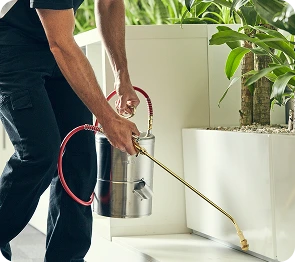Specialist pest control for Hotels


Hotel Pest Control Specialists
A proactive pest management plan is essential for hotels. A single pest sighting — a cockroach in a dining area or a rodent in a guest room — can damage your reputation instantly and cost hundreds of thousands in lost revenue.
Guest experience is at the heart of hospitality, and visible signs of pests can quickly translate into poor reviews, reduced occupancy, and long-term brand damage. Beyond reputation, pests present direct risks: food contamination, damaged stock, compliance breaches, and even forced closures under food safety and public health regulations.
At Competitive Pest Services, we understand the pressures hotels face and the importance of balancing cost with compliance and protection. Below, we outline how pests impact hotel operations and the five most effective ways to reduce pest control expenditure while safeguarding your business.
How Pests Damage Hotel Operations
-
Reputation loss: Negative reviews and social media posts spread quickly, leading to reduced occupancy and declining revenue.
-
Stock contamination: Bed bugs, rodents, and cockroaches destroy linen, food, and consumables, creating costly waste.
-
Regulatory breaches: Failure to manage pests can result in fines, sanctions, or enforced closures.
-
Increased treatment costs: Delayed response or reactive-only measures often lead to larger infestations and longer, more disruptive treatments.
Why Prevention Is Always Better
Preventative pest management is more cost-effective, faster to resolve, and far less damaging to guest experience than reactive treatments. Many infestations go unnoticed until they reach critical levels — by then, reputational and financial losses are already significant.
The 5 Best Ways to Minimise Pest Control Costs in Hotels
1. Implement an Integrated Pest Management (IPM) Plan
IPM is a proactive, tailored approach that targets risks before infestations occur. Working with management and staff, CPS develops site-specific strategies that combine monitoring, prevention, and environmentally responsible treatments, reducing reliance on chemicals and ensuring compliance.
2. Ensure Staff Follow Best Practices
Even the best pest control plan fails without staff engagement. Training staff in hygiene practices, waste disposal, and how to recognise pest entry points or early warning signs reduces risks and long-term costs.
3. Monitor for Early Warning Signs
Housekeeping staff can identify bed bug activity in bedding, while maintenance teams can spot rodent or bird activity in less visible areas. Kitchen staff should monitor food storage and waste zones. Early detection saves time, money, and reputation.
4. Respond Quickly to Issues
Speed is critical. Ignoring or hiding a pest issue risks social media exposure and regulatory action. A rapid response, guided by an IPM strategy, prevents small issues becoming major infestations.
5. Engage a Trusted Pest Management Partner
The most effective way to control costs is to work with an experienced partner like CPS. Our team develops and manages tailored IPM programs, conducts regular inspections, trains staff, and ensures record-keeping that meets compliance standards.
Partner with CPS
With a proactive CPS program, you minimise costs, protect your reputation, and ensure your hotel operates in a safe, compliant, and guest-friendly environment.
Call 1300 766 614 today to arrange an Integrated Pest Management consultation for your hotel.







Comprehensive Pest Management for Hotels
Our specialist pest control solutions for hotels provide lasting preventative measures to keep your property safe, compliant, and pest-free. We understand that pest management is a continuous process, not a one-time fix.
Our tailored programs combine exclusion and control. CPS technicians conduct detailed inspections to identify problem areas that allow pests to enter, then design an exclusion plan to eliminate vulnerabilities. Once pests are under control, our ongoing preventative strategies ensure they don’t return — protecting your guests, staff, operations, and reputation.
Tailored Program for Your Hotel
Every hotel is unique, and what works for one property may not be right for another. At CPS, our detailed inspections and specialist expertise in protecting hotel environments allow us to identify risks specific to each site — from structural vulnerabilities to sanitation issues that can cause recurring pest problems.
By tailoring our programs to your operations, we ensure your hotel remains safe, compliant, and welcoming for guests and staff, while protecting your reputation and brand.
Your solution partner not just a contractor
We’re more than just a contractor – we’re your pest management partner. Our team tracks patterns, monitors risks and works proactively to stop issues before they appear. With detailed reporting and ongoing reviews, we tailor solutions that evolve with your business and deliver long-term protection.
Our pest control services include detailed digital reporting after every visit. You’ll get clear records of treatments, pest activity, and recommendations – all accessible online. This makes compliance easy, supports audit readiness, and helps track long-term trends across single or multi-site operations.
Our trained technicians go beyond surface checks to find the root cause of pest issues. We identify structural vulnerabilities, sanitation risks and entry points often missed by others. With detailed inspection methods and exclusion strategies, we prevent recurring infestations – from crawling insects to rodents and birds – ensuring long-term protection.
Your account manager is your single point of contact for all pest control needs. They understand your sites, risks and compliance requirements, ensuring tailored service plans, fast response times and consistent communication across every location.
Local teams with expert knowledge
We live where we work, and we pride ourselves on old-fashioned service, with 25 years experience in residential pest control from Sydney to Townsville, and Perth to Hobart, providing ant,cockroach, rat, spider, bedbug control and removal and much more.
- Local pest control teams across Australia.
- Expert understanding of pests around the home and yard
- On time, every time and won’t leave a mess
What our clients say
Contact us for a tailored pest solution for your Hotel business
Our team of specialists delivers services nationwide, with coverage across Sydney, the NSW Central Coast, Northern Rivers, Hunter Region, Brisbane, Gold Coast, Canberra, Melbourne, Adelaide, Perth, Launceston, Darwin and Townsville.

